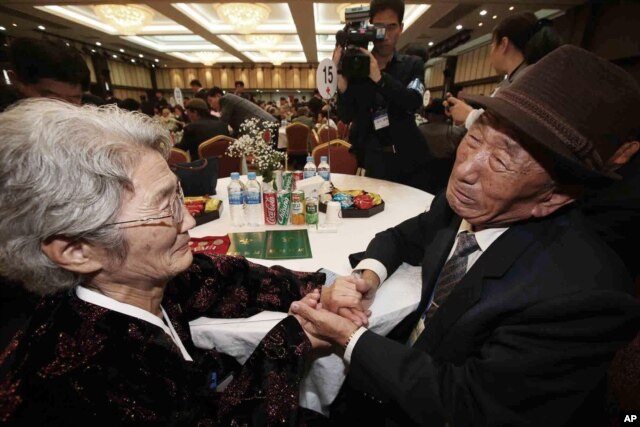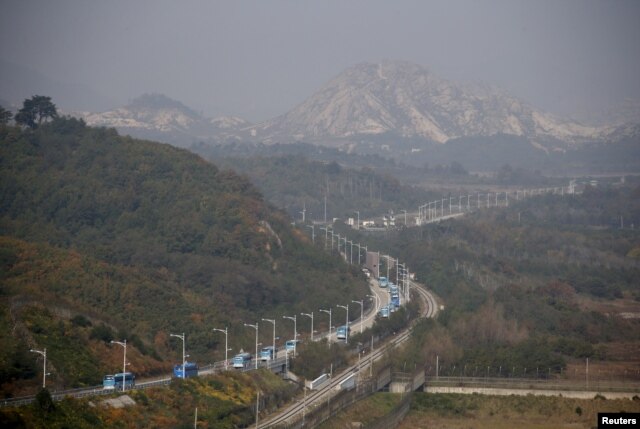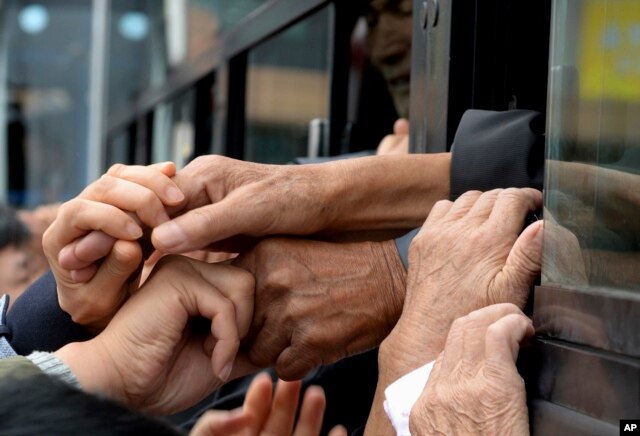Korean Reunions Highlight Emotional Toll of Division
October 23, 2015 8:11 AM
SOKCHO, SOUTH KOREA—
The touching, and at times heartbreaking moments of affection on display at the Korean separated families reunions illustrates the emotional toll the division of the county continues to take on thousands of affected families. It also highlights the strong ties that still bind the Korean people, despite being cut off from one another for over half a century by heavily armed borders and opposing political ideologies.
Footage from the first group of over 500 North and South Korean participants and family members at the three-day reunion documented the joyful hugs that came at the beginning and the tearful parting at the end.
When it was over, a caravan of buses departed the host resort in North Korea’s Mount Kumgang and carried the South Korean participants back across the militarized border to Sokcho.
Emotional high
Many were still on an emotional high as they recounted this long awaited moment.
Many were still on an emotional high as they recounted this long awaited moment.
“I screamed ‘brother!’ And I really wanted to give him a hug. So I went to North Korea to meet him and did it. I was thrilled,” said 77-year-old Oh Chul-hwan, who met her 83-year-old brother for the first time since he went to North Korea to study prior to the war.
South Korean Kim Bock-rack, right, meets with his North Korean sister Kim Jeon Soon during the Separated Family Reunion Meeting at Diamond Mountain resort in North Korea, Oct. 20, 2015.
The 1950-'53 Korean War between the communist North and now democratic South displaced millions of people and separated families after the country was divided.
An estimated 60,000 South Koreans are on a waiting list to participate in separated family reunions, but only a relatively small number so far have been permitted to join in the 20 inter-Korean reunions held since 2000.
Because North Korea forbids most outside contacts with its citizens, including phone calls, letters or email, this was the first contact many participants had with separated family members. And for many who are elderly this is likely the last.
“When he got on a bus, I called out to him and he called my name again with tears. I can’t forget that moment,” said 72-year-old Lee Soon-boon, who went with her husband Park Wan-yong to meet his 83-year-old brother.
Back in Sokcho
In Sokcho, the returning South Korean participants were met by cheering Red Cross volunteers who helped organize the event. While the South Korean government pays for the reunions, the Korean Red Cross operates the lottery system that selects the South Korean participants and also coordinates with the North Korean government.
Yang Seung-hyuk, the president of the Korea Red Cross Sokcho Volunteers Committee, said the reunion proceeded without any problems. And that is partly because participants were told to avoid controversial topics that might be overheard by North Korean officials monitoring the event.
“For example, we educate them not to talk about political matters, and not to criticize North Korea,” said Yang.
Buses transporting South Korean participants for a reunion travel on the road leading to North Korea's Mount Kumgang resort, in the demilitarized zone (DMZ) separating the two Koreas, just south of the DMZ in Goseong, South Korea, Oct. 20, 2015.
When the family reunions were first held in the early 2000s as part of then South Korean President Kim Dae-jung’s “Sunshine Policy” of engagement with the late Kim Jong Il administration, the events were held in Seoul and were envisioned to be organized every few months. Instead they have devolved into yearly events, canceled on occasion due to inter-Korean tensions and held in the North under the watchful eye of Pyongyang monitors.
The prohibition on talking politics did not really concern most of the separated family members. They wanted to talk family, share past memories and learn of loved ones lost. Some were reassured that life for their separated relatives in the North was not as repressive and impoverished as they had feared. Others quietly assessed how their lives diverged over time and under authoritarian versus democratic rule.
“There are no other words I can describe. Only tears can explain,” said Lee Won-jong, who met with his uncle at the reunion for the first time in 65 years.
South Koreans and their North Korean relatives on a bus grip their hands each other to bid farewell after the Separated Family Reunion Meeting at Diamond Mountain resort in North Korea, Oct. 22, 2015.
Unification
For many observers, the joyful reunion of long separated families and forced separation afterward evoked a strong visceral reaction against the imposed division of Korea. But it also reinforced a conviction that family ties will outlast the political systems that seek to keep them apart.
Oh Chul-hwan said the last thing her brother living in North Korea said to her was, “We don’t need to cry because good days will come with reunification someday.”
Conservative South Korean President Park Geun-hye supports family reunions even though she has not been a proponent of engagement with the North. And she supports strong sanctions against North Korea until leader Kim Jong Un halts his country’s nuclear program. But she sees the reunions as a means to increase non-political contact, to help both sides overcome decades of mistrust and to work towards the peaceful unification of the Korean peninsula.
But the authoritarian Kim has been reluctant to support family reunions and has ridiculed Park’s motives in advocating for peaceful unification, saying they are hostile in intent and aimed at the overthrow of the Kim family's rule.
Youmi Kim in Seoul contributed to this report.





No comments:
Post a Comment